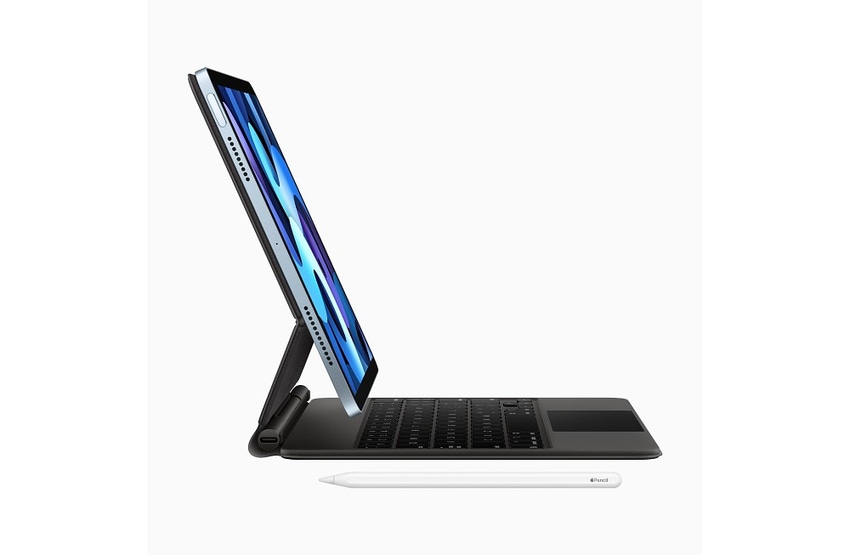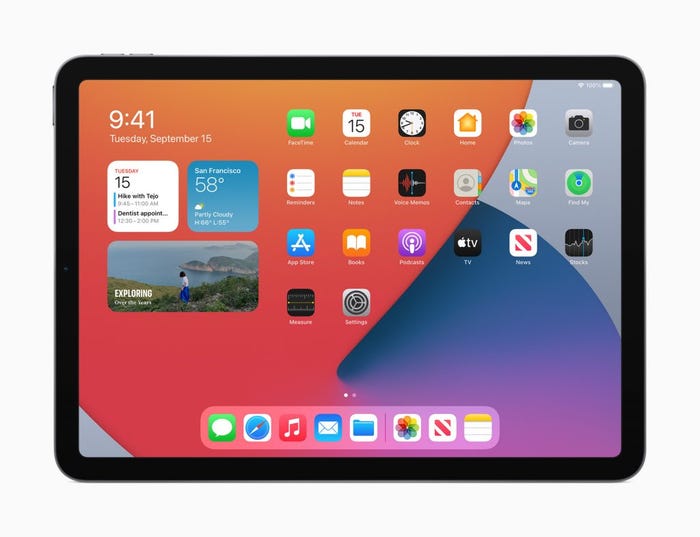Apple also launched the lower cost iPad 8th generation, which ships Sept. 18.
September 16, 2020

Apple is broadening its portfolio of new tablets with the launch of its iPad 8th generation and iPad Air. While both devices, introduced Tuesday, are substantial upgrades of Apple’s volume and midrange iPads, neither is 5G-compatible.
Like all iPads, Apple is offering Wi-Fi-only versions as well as models equipped to run on existing LTE networks. In the U.S., AT&T, T-Mobile and Verizon each said they will offer the new iPads. Apple said the iPad 8th generation is available Friday, Sept. 18, and the iPad Air will ship next month. The carriers said they will carry two new Apple Watches that the company also introduced on Tuesday.
Despite the absence of 5G support, Apple claims the new iPad Air will perform 60% faster on existing LTE networks than the prior version. The new base iPad is available on Sept 18 and the higher-end iPad Air is set to arrive next month. Apple upgraded its premium iPad, the iPad Pro, during the spring.
During this week’s online launch event, Apple did not introduce any new iPhones, a departure from its traditional mid-September launches. The omission was not a surprise to observers, who nevertheless are awaiting what is expected to be new iPhone 12. Apple signaled during its earnings call in late July that it would not launch a new iPhone before October.
According to various reports, the COVID-19 pandemic has delayed the introduction of Apple’s next-generation iPhone until next month. Suppliers have told Bloomberg that Apple has asked them for components to build at least 75 million 5G-compatible iPhones. Apple hasn’t confirmed any of the reports. Not surprisingly, the company offered no hint during Tuesday’s one-hour launch event regarding any future products.
5G Impact on Tablet Market
Although carriers are touting rollouts of their 5G services, availability is still sparse by all accounts. But users often hold on to tablets for many years. Apple emphasized that the new iPad and iPad Air will offer enhanced 4G LTE connectivity and support for Wi-Fi 6. Apple has worked with network equipment providers such as Cisco to optimize Wi-Fi 6 performance.
Ryan Denehy, CEO of managed services provider Electric AI, was surprised that the new iPads won’t support 5G.
“It seems like an odd miss on their part not to have more complete 5G capabilities,” Denehy said. “Many businesses that are heavy tablet users are relying on them in the field where a stronger cell connection is very important.”
Unless Apple adds a 5G-compatible iPad later this year with its new iPhones, Samsung will have an edge. Samsung last month launched its first 5G-ready tablets — the Galaxy Tab 7 and Galaxy Tab 7+. Most of Samsung’s newest phones are 5G-ready, including its latest Galaxy Note20 and foldable Galaxy Z Fold2. Apple isn’t the only provider to launch devices without a 5G option. Microsoft’s new Surface Duo, similar in form factor to the Samsung foldable, only supports LTE.
Nevertheless, Apple is the dominant provider of tablets. The most recent figures from IDC show the iPad holding 32% share of tablets shipped worldwide last quarter. But Apple has given up share to Samsung over the past year, which now has 18%, according to IDC.
iPad Enhancements
The lack of 5G in the new iPad and iPad Air notwithstanding, the new tablets both offer enhanced capabilities. Both will come with …
… the new iPadOS 14, announced in June available for download on existing iPads today.

Apple’s OS 14, rolling out to devices on Wednesday, is displayed here on an iPad.
Since launching the first iPad a decade ago, Apple has shipped 500 million, CEO Tim Cook said during Tuesday’s introduction. While tablet growth has slowed, Cook noted that more than half of new iPads are customer’s first Apple tablets. Cook indicated that COVID-19 has propped usage of iPads for communications, for education and health care.
Cook also noted that the iPad app store now has 1 million apps.
“The iPad can do whatever you need it to do,” he said.
8th Generation iPad
Among the two new devices, the new iPad 8th generation is based on Apple’s most popular iPad SKU. Like its predecessor, it has a 10.2-inch display. But it is powered by Apple’s A12 Bionic CPU and GPU chipset. The company claims it will offer 40% improved processing performance and will render graphics twice as fast. Apple pointed to its new neural networking engine designed to process 5 trillion operations per second.
The base model with 32GB of storage with Wi-Fi only connectivity costs $329, and with LTE it is $459. Versions with $128 GB cost $100 extra.
4th Generation iPad Air
The iPad Air is the midrange of Apple’s tablet lineup. At the high end, Apple earlier this year rolled out its 4th generation iPad Pro. The iPad Air is also on its fourth release and runs Apple’s new A14 Bionic processor. It has a slightly larger, 10.9-inch display with Apple’s new Liquid Retina True Tone.
It is a more fully featured iPad with support for Apple’s Magic Keyboard, which supports a trackpad. The new iPad Air also supports Apple’s 2nd generation pencil and has a higher resolution 12MP camera. Moreover, it has a USB-C interface for connectivity, replacing Apple’s Lightning connector, which still lives on the 8th generation iPad. The iPad Air starts at $599 for Wi-Fi only with 64 GB of storage. A comparable model with LTE connectivity costs $729. Models with 256 GB of storage cost $150 extra.
Read more about:
AgentsAbout the Author(s)
You May Also Like


